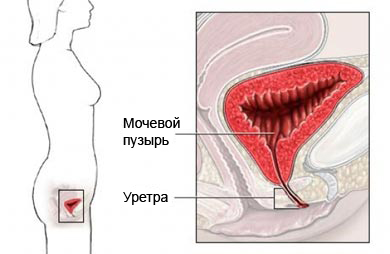Suprapubic cystostomy
Description suprapubic cystostomy
Suprapubic cystostomy is a procedure, performed to empty the bladder (organ, that collects and holds urine). Tube, called a catheter, output from the lower abdomen to drain fluid from the bladder.

Reasons for suprapubic cystostomy
This procedure is performed, if you can not urinate and a catheter can be inserted through the urethra. Urethra – channel, through which urine exits the body of the bladder. Urine may not pass through the urethra due to the following issues:
- Severe urethral stricture, ankylurethria;
- Blocking due to the following disorders:
- Stones in the kidneys;
- Inflammation;
- Infection;
- Damage;
- Prostate disease (males).
Nadlobkovaâ cystostomy can be carried out in the following cases:
- It is necessary to avoid damage to the urethra;
- We need to do surgery on the urethra or nearby organs;
- For long-term catheter insertion.
Possible complications of suprapubic cystostomy
Complications are rare, but no procedure does not guarantee the absence of risk. Before, how to perform a suprapubic cystostomy, you need to know about possible complications, which may include:
- Damage to the bowel or other surrounding organs;
- The need for repeat procedures;
- Infection;
- Bleeding;
- Blood clots;
- The negative reaction to anesthesia.
Factors, that may increase the risk of complications:
- Bleeding disorders or taking drugs, reduce blood clotting;
- Obesity;
- Smoking;
- Previous abdominal surgery;
- Bladder Cancer.
How is the suprapubic cystostomy?
Preparation for the procedure
Your doctor may do the following:
- Perform a physical exam;
- Assign blood and urine tests, Taking pictures of the bladder and surrounding organs;
- To determine the possible consequences and potential risks of anesthesia.
It should also discuss with your doctor to take medication. You may be asked to stop taking certain medicines a week before the procedure,:
- Aspirin or other anti-inflammatory drugs;
- Blood thinners, such as warfarin;
- Clopidogrel.
The doctor may prescribe certain medications before receiving surgery.
In just a few days before surgery:
- We need to organize a trip home from the hospital;
- Maybe, you have to not eat for eight hours before surgery;
- If there is the doctor's instructions, you need to drink only clear liquids (water, clear juices, tea) before the operation. You may be asked to drink more fluids, to fill the bladder.
Note: These steps are not always possible in emergencies.
Anesthesia
It can be used local anesthesia with or without sedation. During the procedure, does not feel any pain.
Procedure suprapubic cystostomy
After application of anesthesia and pain management field operations, the doctor will use ultrasound or other imaging techniques for the detection of bladder. He then inserts a needle through the lower part of the abdomen into the bladder. Special wire (guide catheter) It is injected through the needle into the bladder, to prepare the site for a catheter. Special catheter over a guidewire inserted into the bladder and secured in the abdominal skin. It can be used air balloon, to keep the catheter in place. After that, the cut, made in the skin (so-called stoma) bandage.
How long will the suprapubic cystostomy?
10-45 minutes.
Suprapubic cystostomy – Will it hurt?
Anesthesia prevents pain during the procedure. You will be given pain medication, to alleviate pain and discomfort after the operation.
The average hospital stay
You can leave a hospital overnight or go home the day of surgery.
Care after suprapubic cystostomy
In the hospital
The hospital staff does the following:
- Monitor the process of recovery;
- It helps to start eating and walking;
- Provides painkillers;
- Teach, how to care for the catheter.
Home Care
When you return home, follow these steps:, to ensure the normal recovery:
- Take your medicines as intended;
- Avoid heavy lifting for two weeks;
- Drink plenty of fluids (8-10 glasses a day);
- Do not drive or have sex, until the doctor says it's safe;
- Follow the instructions for the care of the catheter;
- Keep the stoma and the incision clean and dry:
- Clean the incision site, as indicated by medical staff;
- Use a soft cloth to wash and wipe the incision area;
- Daily dressing changes, or more, if indicated doctor;
- We need to ask your doctor about, when it is safe to shower, bathe, or to expose the surgical site to water;
- Be sure to follow your doctor's instructions.
Contact your doctor after suprapubic cystostomy
After returning home, you need to see a doctor, If the following symptoms:
- Pain or cramps;
- Redness or soreness around the catheter;
- Urine cannot drain through a catheter;
- The catheter falls out of the cut;
- Changes in the frequency, Smell, appearance, or volume of urine;
- Signs of infection, including fever or chills;
- Red water.
